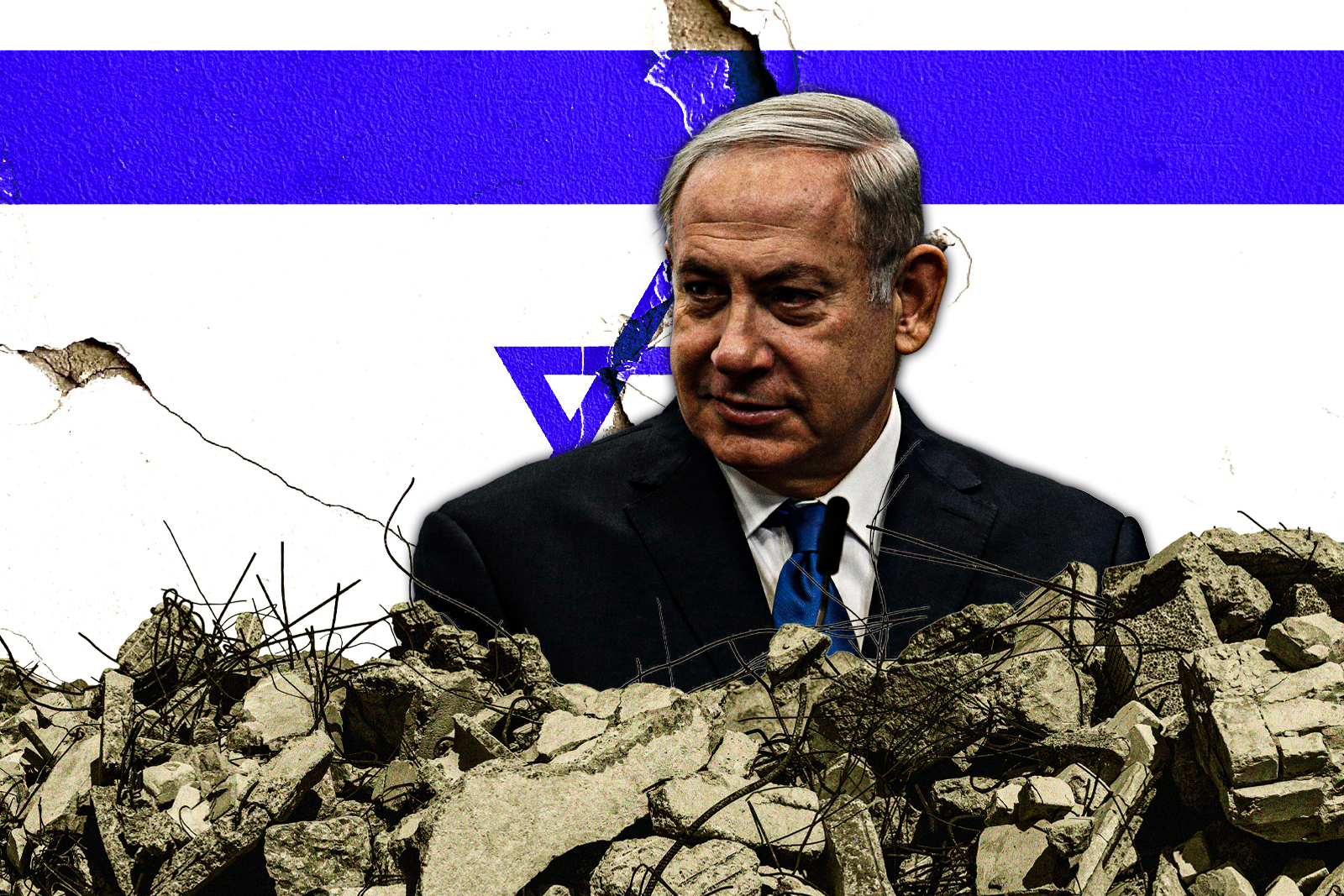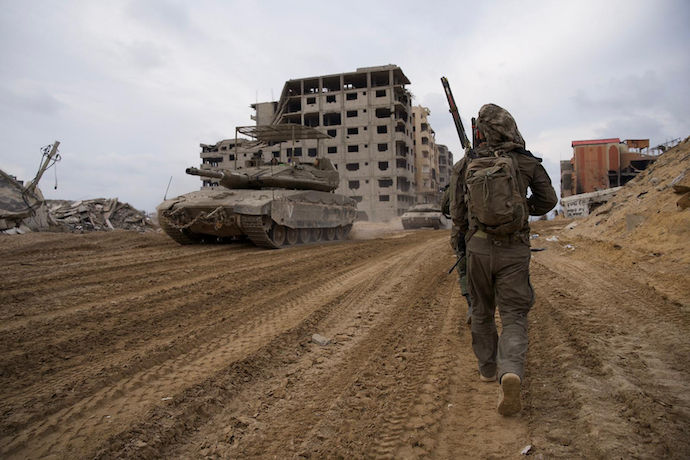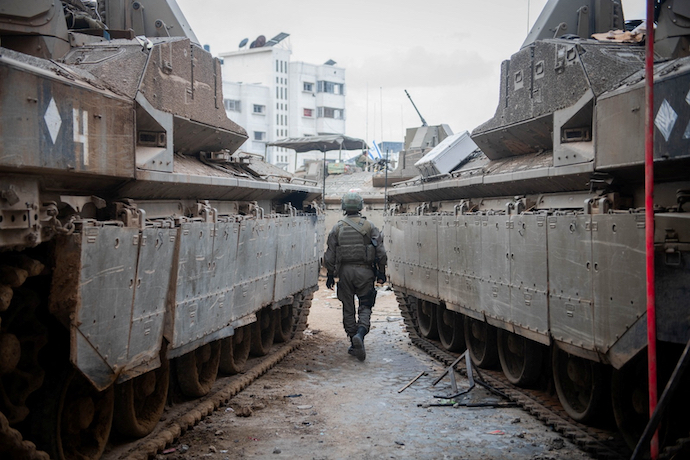
Israel’s Containment Myth, Unmasked
Prior to October 7th, 2023, the myth of containment reigned supreme. To Israel’s leadership and particularly to the Netanyahu governments of the past 15 years, Hamas was surely a threat — but one that would largely be deterred by Israel’s outsized military might, its supposedly secured border with Gaza, and its elaborate defense infrastructure. While periodic flare-ups between Gaza and Israel were viewed as inevitable byproducts of an unresolved and ongoing ethnonational conflict, the scale and brutality of the October 7th attacks fundamentally shocked the people of Israel and the wider global community.
That Hamas managed to invade Israel — let alone to brutally murder hundreds of Israeli citizens and abduct over 200 more into Gaza — has profoundly shattered Israel’s previous faith in its ability to contain Hamas. But to attribute Israel’s myth of containment to wishful thinking, simple naivete, or a flawed security system would be to fundamentally misunderstand the Israeli government’s approach to Hamas. In fact, Netanyahu and his allies have exploited this philosophy of containment to further their own political objectives: namely, to avoid peace negotiations and forestall the eventual emergence of a sovereign Palestinian state.

Israel’s containment strategy operated from the fundamental assumption that Hamas could be reasoned with — that placating and sustaining Hamas, up to a certain extent, would assuage the organization’s terroristic impulse. To do so, Israel held negotiations with Hamas leadership, allowed funds from Qatar to reach Gaza, and attempted to increase the quality of life for Gaza’s civilians. Cultivating a culture of restraint rather than confrontation, the Israeli containment policy attempted to pacify what it could not easily uproot. In tandem with its relations with the Palestinian Authority (PA) in the West Bank — which Israel regularly undermines by conducting military raids and turning a blind eye to outbursts of settler violence — the Israeli containment strategy has become a powerful tool to serve Netanyahu’s political interest of preventing a Palestinian state.
In 2019, Netanyahu indeed argued that “whoever is against a Palestinian state should be for transferring the funds to Gaza, because maintaining a separation between the PA in the West Bank and Hamas in Gaza helps prevent the establishment of a Palestinian state.” In the absence of unified Palestinian political representation, Israel can indeed easily dodge any efforts towards final-status negotiations or a potential peace deal; that the political party governing Gaza is an internationally recognized terrorist organization makes such negotiations even less likely.
These policies constitute the Israeli myth of containment, a disastrous marriage of overblown faith in Israel’s intelligence capabilities and a preference to contain rather than to confront Hamas. Internal discord prompted by Netanyahu’s judicial overhaul further attenuated Israel’s ability to respond to security concerns. Even worse, the ideological zeal of Netanyahu’s cabinet radically reorganized the state’s priorities, with the safety of West Bank settlers seeming to eclipse the needs of Israeli civilians within the Green Line.
The settlement enterprise is indeed so fundamental to Netanyahu’s government that “the focus of the army became policing the West Bank, guarding the settlers, not guarding the borders” — a gambit that would prove disastrous on October 7th, when troops who could’ve been protecting the border were instead dispatched to the West Bank to attend to the needs of settlers observing Simchat Torah.

While Israel’s security failures leading up to October 7th are certainly multicausal, it is necessary to critique the political motivations underlying Netanyahu’s policy of containment: namely, his desire to avoid Israeli-Palestinian peace talks and prevent the creation of an independent Palestinian state. It is no secret that a weak Palestinian Authority absolves Netanyahu of some responsibility to negotiate with the Palestinians, a fact which Netanyahu reportedly enjoys. Nor is it a secret that Hamas’s existence, as the main competing leadership of the PA, also serves to weaken what little authority Abbas and the PA can still cling to. Moreover, Netanyahu’s failed attempts to dull Hamas’s jihadist nature — rather than seek peace negotiations — reflect the massive inadequacy of the containment myth.
While it would be irresponsible to view the entire Israeli-Palestinian conflict through the lens of Israel-Gaza relations, or through the failure of the Israeli containment strategy, the relationship between Israel-Gaza tensions and Israel-West Bank flare-ups cannot be ignored. In fact, the reverberations of October 7th and the resulting Israel-Hamas war have further destabilized all of Israel and Palestine — and thus increasingly endangered any remaining possibility of peace. Since October 7th, clashes in the West Bank have increased in frequency: settler violence against Palestinians, allegedly “arbitrary” and excessive Israeli arrests of Palestinians, and raids into Palestinian villages have indeed all intensified.
Although different organizations govern Gaza and the West Bank, and the material conditions in Gaza and the West Bank stand in stark contrast, one cannot discount the interconnectedness of these territories. As such, bloodshed and unrest in Gaza become bloodshed and unrest in the West Bank — and thus the Israeli myth of containment has not only failed to stabilize Gaza but also to maintain whatever tatters of peace remained in the West Bank.
So, what does the failure of the containment myth tell us about the future of the Israeli-Palestinian conflict? For one, it demonstrates that conflict between Israel and Gaza — itself a small part of the broader Israeli-Palestinian conflict — cannot be sidestepped nor “contained.” It reminds us that there is no substitute for a peaceful resolution of the conflict; there is no replacement for the sovereignty, freedom, and safety of both peoples.
While creating the political and public will to forge a functioning, lasting peace deal remains a challenge, October 7th made one thing painfully, abundantly clear: that the status quo in Israel and Palestine has utterly failed to keep Israelis and Palestinians safe. We cannot continue to rely on a policy of containment, nor can we afford to neglect the very real need for a negotiated, final peace agreement between Israel and Palestine. We also cannot ignore the essential fact that Israel’s right-wing policy of containment actually strengthens extremist terror groups, including Hamas.
A future of endless rocket exchanges, arbitrary arrests, hostage-taking, weak negotiations, and zero-sum thinking simply will not do; not for Palestinians, not for Israelis. The only way to weaken the appeal of extremist groups — within both Israeli and Palestinian society — is to provide a stable, secure future for both peoples that does away with the mutual demonization and zero-sum mentality that have come to define the conflict.
Perhaps this work begins with strengthening the PA, negotiating an end to the settlement enterprise, and pragmatically setting the groundwork for a Palestinian state; perhaps it begins with holding Hamas accountable for mass rape, murder, and hostage-taking of civilians, and holding the State of Israel accountable for its seemingly indiscriminate air strikes on civilian infrastructure in Gaza, in addition to other human rights abuses and anti-democratic policies.
But on a more fundamental level, perhaps we must first acknowledge that the long-term safety and security of both Israeli Jews and Palestinians — on the ground and in the diaspora — depends on the recognition that our fates and our freedoms are intertwined: that containment and the endless cycle of bloodshed and violence it has produced is unsustainable. Israel and Palestine have endured more than enough grief, trauma, and violence; we must rise to the moment to ensure that this is the last of it.
